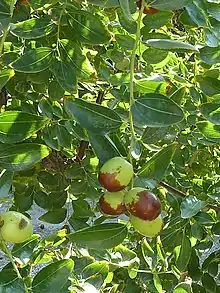عناب
Arabic

عُنَّاب
Etymology
From the root ع ن ب (ʿ-n-b) meaning a grape, berry, fruit, flower, or shoot; from Proto-Semitic *ʿanbab- (“fruit, flower, shoot”), ultimately Proto-Afro-Asiatic *ʿanbab- (“plant, flower”). Compare Arabic عِنَب (ʿinab, “grape”), Hebrew עֵנָב (ʿēnāḇ, “grape”), Hebrew עֲנָבָה (ʿănāḇā), Aramaic עֲנָבָא (ʿănnāḇā, “stalk of grapes”), עִנְּבָא (ʿinneḇā, “cluster of grapes”), עִנְבְּתָא (ʿinbəṯā, “berry”), Classical Syriac ܥܷܢܒ݂݁ܳܬܐ (ʿinbəṯā, “berry”), Ugaritic 𐎙𐎐𐎁 (ġnb, “fruit, grape(s)”), Sabaean 𐩲𐩬𐩨 (“vineyard”), and Akkadian 𒄧 (GURUN /enbu/, “fruit”).
Pronunciation
- IPA(key): /ʕun.naːb/
Noun
عُنَّاب • (ʿunnāb) m (collective, singulative عُنَّابَة (ʿunnāba))
- jujube (Ziziphus jujuba)
- c. 1200, يحيى بن محمد بن أحمد بن العوام [Yaḥyā ibn muḥammad ibn ʾaḥmad ibn al-ʿawwām], José Antonio Banqueri, editor, كتاب الفلاحة [Book on Agriculture], volume 2, Madrid: Imprenta Real, published 1802IA, Cap. 30, Art. 8, page 429:
- وفيه ينضج الخوخ والرمان والسفرجل ويسود بعض حب الريتون ويطيب حب شجر المشتهى والبلوط والقسطل ويفصل الجوز وهو أفضل وقت جمعه وفيه يجمع الصنوبر والعناب ويظهر فيه الأسفاراج وفيه يبدئ بالحرث والزراعة بعد نزول الغيث وذلك في بعض البلاد وفيه تجمع الكراويا والكمون واللوبياء والدرونج وبزور الأحباق والكزبر والأرز وتقلع الحناء.
- In this ripen the peach, the pomegranate, and the quince, and some olives become black, and the common whitebeam and the oak and the chestnut become good, and the walnuts open, and it is the best time to gather them, and in it pines and jujubes are harvested, and in it asparagus appears, and one begins to till and sow after the rain in some regions, and one collects caraway and jeera and green beans and leopard’s bane and basil seeds and coriander and rice and pulls the henna.
-
Declension
Declension of noun عُنَّاب (ʿunnāb)
| Collective | basic collective triptote | ||
|---|---|---|---|
| Indefinite | Definite | Construct | |
| Informal | عُنَّاب ʿunnāb |
الْعُنَّاب al-ʿunnāb |
عُنَّاب ʿunnāb |
| Nominative | عُنَّابٌ ʿunnābun |
الْعُنَّابُ al-ʿunnābu |
عُنَّابُ ʿunnābu |
| Accusative | عُنَّابًا ʿunnāban |
الْعُنَّابَ al-ʿunnāba |
عُنَّابَ ʿunnāba |
| Genitive | عُنَّابٍ ʿunnābin |
الْعُنَّابِ al-ʿunnābi |
عُنَّابِ ʿunnābi |
| Singulative | singulative triptote in ـَة (-a) | ||
| Indefinite | Definite | Construct | |
| Informal | عُنَّابَة ʿunnāba |
الْعُنَّابَة al-ʿunnāba |
عُنَّابَة ʿunnābat |
| Nominative | عُنَّابَةٌ ʿunnābatun |
الْعُنَّابَةُ al-ʿunnābatu |
عُنَّابَةُ ʿunnābatu |
| Accusative | عُنَّابَةً ʿunnābatan |
الْعُنَّابَةَ al-ʿunnābata |
عُنَّابَةَ ʿunnābata |
| Genitive | عُنَّابَةٍ ʿunnābatin |
الْعُنَّابَةِ al-ʿunnābati |
عُنَّابَةِ ʿunnābati |
| Dual | Indefinite | Definite | Construct |
| Informal | عُنَّابَتَيْن ʿunnābatayn |
الْعُنَّابَتَيْن al-ʿunnābatayn |
عُنَّابَتَيْ ʿunnābatay |
| Nominative | عُنَّابَتَانِ ʿunnābatāni |
الْعُنَّابَتَانِ al-ʿunnābatāni |
عُنَّابَتَا ʿunnābatā |
| Accusative | عُنَّابَتَيْنِ ʿunnābatayni |
الْعُنَّابَتَيْنِ al-ʿunnābatayni |
عُنَّابَتَيْ ʿunnābatay |
| Genitive | عُنَّابَتَيْنِ ʿunnābatayni |
الْعُنَّابَتَيْنِ al-ʿunnābatayni |
عُنَّابَتَيْ ʿunnābatay |
| Paucal (3-10) | sound feminine paucal | ||
| Indefinite | Definite | Construct | |
| Informal | عُنَّابَات ʿunnābāt |
الْعُنَّابَات al-ʿunnābāt |
عُنَّابَات ʿunnābāt |
| Nominative | عُنَّابَاتٌ ʿunnābātun |
الْعُنَّابَاتُ al-ʿunnābātu |
عُنَّابَاتُ ʿunnābātu |
| Accusative | عُنَّابَاتٍ ʿunnābātin |
الْعُنَّابَاتِ al-ʿunnābāti |
عُنَّابَاتِ ʿunnābāti |
| Genitive | عُنَّابَاتٍ ʿunnābātin |
الْعُنَّابَاتِ al-ʿunnābāti |
عُنَّابَاتِ ʿunnābāti |
This article is issued from Wiktionary. The text is licensed under Creative Commons - Attribution - Sharealike. Additional terms may apply for the media files.